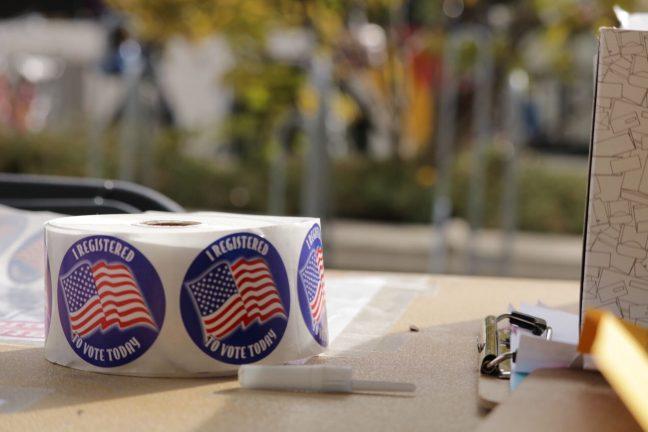With midterm elections fast approaching, campaign efforts are in full swing. Each party has selected issues to place at the forefront of their campaigns with hopes of maximizing favorable voter turnout. Democrats in Wisconsin are branding the midterm elections around abortion access, and Republicans have chosen crime and public safety to be at the head of their campaign.
While abortion and public safety are crucial issues, given the current political climate, labeling elections under one specific political issue may be more nuanced than previously thought.
Political parties and candidates do not select these political issues at random. University of Wisconsin associate professor Eleanor Powell explained that parties are incredibly strategic in selecting the issues they campaign on. Each party does significant amounts of polling in advance to determine where public opinion lies and to decide what aligns well with how voters evaluate them.
Evidently, both parties’ selections of these issues utilize this strategy extremely well. A poll by Marquette University Law School revealed abortion policy was the number one concern among Democratic voters in Wisconsin. The same poll showed crime as the third-most concerning issue among Republican voters. With abortion and crime being a prime concern for Wisconsinites, selecting these issues to place at the forefront of campaign efforts is an efficient tactic.
Obviously, the goal of any politician campaigning is to encourage voters to vote for them instead of the candidate from the opposing party. But, that is not the only goal of campaigning messages, according to Powell.
GOP efforts to restrict voting access reflect antidemocratic values
A key objective of each party, and consequently, their campaign messages, is to mobilize voters to simply show up at the polls. Historically, Wisconsin has seen a lower voter turnout in midterm elections compared to presidential elections.
According to data from the Wisconsin Election Commission, 73% of voters in Wisconsin voted in the 2020 presidential election, but only 59% of Wisconsin voters voted in the midterm election in 2018. Campaigning around popular issues such as abortion policy and crime can mobilize voters to simply show up at the polls, regardless of which candidates they vote for.
Despite these strategic efforts, branding elections and campaigning efforts around select issues can be disadvantageous to some extent. In the same Marquette University Law School poll, 68% of Wisconsin voters reported being very concerned about inflation. Similarly, 47% of voters felt very concerned about taxes.
While taxes and inflation are discussed by both parties to some degree, they are not at the forefront of their campaigns in the way abortion policy and crime have been thus far. When candidates and parties fail to heavily campaign on certain issues that some voters find important, they can end up alienating those voters. While it may not make them more likely to vote for the opposing party, it is more likely to deter them from voting at all, Powell said.
Elected officials are representatives of the people — not just for one or two issues, but for all governmental issues, from economics to climate change. People elect officials not just on the basis of them solving one problem, but on the basis of being represented in democracy for all governmental issues.
Hence, people expect elected officials to discuss several societal issues — including taxes and inflation, among others — and to provide solutions for how they will address these issues if elected. By doing so, candidates will make the people feel heard and represented.
Political influence in wording of ballot referenda unfairly skews voters’ choices
In highlighting abortion policy and crime, the importance and nuances of several other issues are being overshadowed for voters.
One issue not being highlighted in the media is the makeup of the state legislature in Wisconsin. Currently, the Republicans are one seat short of a supermajority — ⅔ of the seats — in the State Senate and five seats short in the State Assembly. With a supermajority, Republicans can override any governor’s veto, resulting in huge consequences for the outcomes of state policies.
While the U.S. is more polarized than ever with the two-party system, having somewhat equal representation of Democrats and Republicans — not a supermajority — in the state legislature helps minimize the consequences of this polarization by allowing for more debate and deliberation on policies.
A supermajority would only impede this debate and deliberation and likely result in more, and possibly only, Republican-favored policies to be passed, regardless of the party of the governor.
While abortion is heavily debated between the two parties and at the forefront of media coverage, the future of abortion policy isn’t the only thing at stake in this election.
The legal foundation for overturning Roe v. Wade was on the basis of the right to privacy. Several other rights that have been normalized in current American society are based on the same right to privacy, Powell said. Rights to contraception, contraception availability, right to privacy and gay marriage are all in that realm, according to Powell.
Though these rights are not explicitly on the ballot, the representatives elected by voters will control the composition of the Supreme Court in the future, and therefore greatly impact the future policy outcomes pertaining to these issues.
Regardless of which issues Democrats and Republicans highlight in their campaign efforts, all governmental issues are on the ballot in one way or another. Wisconsin is purple, now more than ever, as the slipperiest of swing states. Several outcomes of this election will be decided by a matter of a few votes. Each individual’s vote matters in Wisconsin, now more than ever, and ultimately, it all comes down to one thing — every Wisconsinite needs to get out there and cast their ballot.
Janani Sundar ([email protected]) is a senior majoring in neurobiology.





















